A sidewalk dining permit is a Revocable "R" Permit to grant a conditional encroachment for restaurants to occupy the adjacent right-of-way for dining purposes. Sidewalk Dining is currently administered through the Sidewalk Dining Policy from the Board of Public Works. This Policy was updated on June 23, 2023 and included several recommendations adopted by the Board of Public Works.
Al Fresco Transition Program Information (Sidewalk and On-Street Dining)
In May 2020, a Temporary Use Authority program to promote the economic vitality of our City’s restaurants during the COVID-19 emergency launched. The program created a new, streamlined process for restaurants to obtain approvals for outdoor dining on private property, sidewalks, and in the streets adjacent to their establishments. It also temporarily relaxed regulations that would otherwise govern outdoor dining, including zoning regulations, fees, and permitting procedures. The City has also developed an L.A. Al Fresco Disabled Access Toolkit to guide businesses in meeting their obligations to provide equal access to customers with disabilities.
In response to the success of the Temporary Use Authority program, the City has now made LA Al Fresco permanent. For applicants who participated in the Temporary Use Authority program, a simplified transition process will be available from February 1, 2024 through January 31, 2026 to move to the permanent Revocable Permit program.
For applicants eligible for the transition program, the following will be required:
NOTE: If the applicant has both sidewalk dining and on-street dining under the same application, one Special Engineering Fee is required.
- Sidewalk Dining:
- Online Revocable Permit application and fee
- Sewerage Facilities Charge (SFC) per seat added (one-time)
- Waiver of Damages
- Liability Insurance
PLEASE NOTE: Elements listed as "unallowable" in the Temporary Use Authority program are not eligible for the Al Fresco Transition Program. If an Applicant wishes to have these elements as part of their Al Fresco dining permit, they must apply for a standard Revocable Permit.
- On Street Dining
- Online Revocable Permit application and fee
- Application review fee (one-time payment) by LADOT if requesting approval for On-Street Dining
- Sewerage Facilities Charge (SFC) per seat added (one-time)
- Waiver of Damages
- Liability Insurance
- An “A-Permit” application and fees, if applicable, when installation and/or construction is required (may also include a structural review)
Applicants can also get additional information about how to apply for the Revocable Permit by clicking this link.
REQUIREMENTS (Standard Revocable Permit Process)
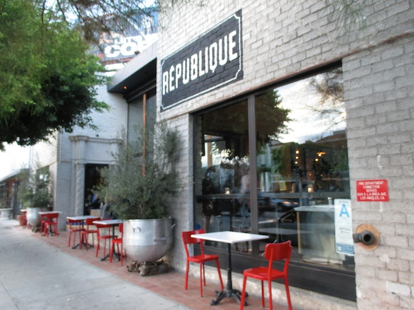 General Sidewalk Dining
General Sidewalk Dining
Once an application has been received, BOE Staff should confirm the following items are included in the completed application. This also applies to new permits issued when there is a change in restaurant ownership. Sidewalk Dining information below comes from the Revised Policy from the Board of Public Works on 06/23/23, Previous Board Report dated October 20, 2021, April 3, 2019, April 10, 2006, and current BOE processes.
- Sketch with dimensions: Should also include all existing street furniture protruding above the finished surface of the sidewalk such as streetlights, power poles, fire hydrants, news racks, street trees & tree wells, parking meters, street signs, etc.
- Copy of the Deed/Lease Agreement: If not the landowner, the lessees shall provide proof of legal tenancy or a lease agreement.
- Fees:
- Sidewalk Dining Permit Processing Fee - Applications for all new revocable permits for sidewalk dining shall be charged the Tier 1 fee per the current BOE fee schedule, "Standard Fees, Charges and Deposits".
Tier 2 Revocable Permit Fee for cases where a field investigation is required (as determined by BOE) when there is a discrepancy between existing and the conditions shown by the Applicant.
Tier 3 Revocable Permit Fee for the cases where Board approval is required to deviate from the Sidewalk Dining Policy or there is a request to appeal a BOE decision to the Board.
BOE shall charge the hourly Special Engineering Fee up to a maximum of 3 hours if no changes are proposed to the layout of the existing dining area. New Waiver of Damages and Proof of Liability Insurance will be required to be signed and notarized.
Special Engineering Fees for cases where BOE anticipates the staff time to process the permit application is three hours or less and for which no field investigation is required. 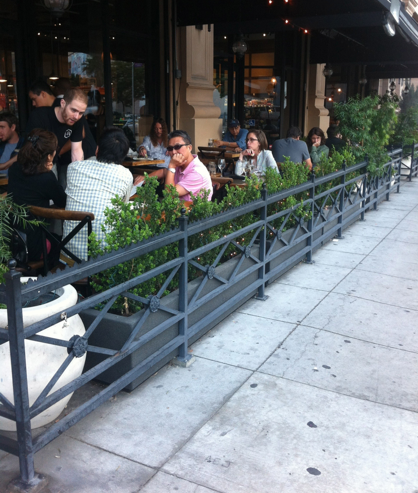 Sewerage Facility Charge (SFC) – SFC fees shall be required for all additional outdoor seating based on the number of seats allowed.
Sewerage Facility Charge (SFC) – SFC fees shall be required for all additional outdoor seating based on the number of seats allowed.- Change in Ownership: A change in property or restaurant ownership shall require a new sidewalk dining permit in cases where the prior owner, or their authorized signatory, was the permittee for sidewalk dining. Fees for a change in property or restaurant ownership include:
- No Changes to the Layout: Special Engineering Fees shall be required if no changes are proposed to the layout of the existing dining area. New Waiver of Damages and Proof of Liability Insurance will be required to be signed and notarized.
- Changes to the Layout - Refer to item #3 for fee schedule if changes are proposed to the layout of the existing dining area. The Waiver of Damages and SFC will also have to be modified if there is a change of layout.
- Sidewalk Dining Permit Processing Fee - Applications for all new revocable permits for sidewalk dining shall be charged the Tier 1 fee per the current BOE fee schedule, "Standard Fees, Charges and Deposits".
- Proof of Sufficient Liability Insurance: Insurance in an amount not less than $1,000,000. Applicant shall provide proof of Liability Insurance per the "Liability Insurance Requirements"
- Waiver of Damages Signed and Notarized: City staff to prepare this for the applicant. A Waiver of Damages shall be signed by an entity with signatory authority on behalf of the property owner, lessee or an applicant assistant authorized by the BOE; notarized by a notary public; and submitted to the BOE for review.
- Technical Review: BOE will conduct a technical review of the proposed encroachments to verify the designs are safe, that the materials are suitable for the public right-of-way; and that the encroachments will not damage or restrict access to existing sidewalks, street trees or other infrastructure. As a part of the technical review, the BOE will also review the cumulative impact to the general area to verify that adequate space remains for the other sidewalk functions that exist at the site. The BOE may establish more detailed rules regarding sidewalk dining within the framework of the Board Sidewalk Dining Policy. The complete rules for the program shall be made available in the online BOE Permit Manual which may be found at https://engpermitmanual.lacity.org/.
- Confirm the proposed location is in the public right-of-way:
- May be allowed in any portion of the sidewalk area fronting a property provided that an acceptable pedestrian access route (PAR) is provided along the frontage of the portion of the property proposed to contain sidewalk dining, and when applicable, connecting to the property entrance.
- May be allowed in an area fronting adjoining properties if written consent is obtained from adjoining property owners provided that an acceptable PAR is provided along the frontage of the portion of the property proposed to contain sidewalk dining, and when applicable, connecting to the property entrance.
- Minimum Clearance: The minimum required clear space between encroachments (tables and chairs) and fixed street amenities such as poles, parking meters, tree wells, street lights, and signs shall be 4 feet, provided that 5-foot by 5-foot passing areas are provided at 200-foot intervals. The applicant must identify the PAR which shall be clear of obstructions including but not limited to queue lines and restaurant workers. Any violation may result in revocation of the R-Permit.
Exemptions to the 4-foot minimum PAR width around isolated barriers, such as tree wells, not more than once per every 20 feet, may be granted by the City Engineer. - Umbrellas: Umbrellas must be approved by BOE personnel and have a 7-foot minimum height clearance
- Planters: If the Applicant selects plants listed in the Parkway Landscaping Guidelines, StreetsLA will not have to review the plant selection. Otherwise, StreetsLA must review the plant selection. The planter itself will be reviewed by BOE staff for appropriateness. BOE counter staff may consult with the Design Standards and Investigation Group, if necessary.
- Alcohol: Consumption of alcohol within the public right-of-way is not allowed without the approval from the Department of City Planning and the California Department of Alcoholic and Beverage Control.
- Smoking: Smoking is not allowed within 10 feet of the sidewalk dining area, per the LAMC 41.50.
- Noise Restriction: All sidewalk dining areas shall comply with the operation requirements in accordance with the LAMC Section 12.21.A.24 and any other applicable local rules and requirements.
- Compliance with Other Regulations: In addition to the Board Policy on Sidewalk Dining, permittees must comply with all other applicable regulations including, but not limited to, state and county health regulations.
- Applicant Assistance: Business Improvement Districts may assist with completing some of the requirements of this policy such as the preparation of the application and the signing of the Waiver of Damages. The City Engineer may use their discretion to allow other entities that want to assist that are not the owner or lessee.
- LAMC 12.03 (Outdoor Eating Area within Private Property) Compliance: Confirm the Sidewalk Dining application comply with LAMC 12.03 (Outdoor Eating Area) as applied to private property by the Department of Building & Safety (DBS). LAMC 12.03 reads as follows:
- OUTDOOR EATING AREA: When used in Sections 12.12.2, 12.13, 12.14, 12.21.1 and 12.24, this term shall refer to a covered or uncovered portion of a ground floor restaurant which is not completely enclosed within the building; is used primarily for the consumption of food and/or drinks by the patrons of the restaurant; and is not larger than 50 percent of the dining area of the ground floor restaurant. A “ground floor” restaurant refers to any restaurant with an average finished floor elevation either below or not more than three feet above natural grade as measured from any point along the exterior building wall closest to the restaurant. (Amended by Ord. No. 165,403, Eff. 2/17/90.)
- Allowable Number of Seats: BOE shall approve the space available for sidewalk dining use based on the conditions outlined in this manual (Sidewalk Dining Policy BPW-2021-0745). There is no set limit to the number of sidewalk dining seats that the BOE may approve.
- Attached Railings/Fences: Fixed railings or barriers (30-inch minimum/42-inch maximum in height) shall be required if the clear space between the sidewalk dining area to the curb or other fixed amenities is less than five feet. If the clear space is 5-feet or more, rails or barriers are not required. Non-fixed rails may be allowed when the clearance is 5-feet or more, subject to BOE approval. Attached railings/fences shall be installed by obtaining an A-Permit and installed at locations approved by BOE (except Hollywood Walk of Fame).
- Aisle ADA Compliance: Aisle widths must meet ADA and Fire Code requirements within the railed sidewalk dining area
- Visibility Triangle: No encroachments are within the visibility triangle as described in LAMC 62.200.
- Awning: Existing or proposed awnings hanging above the sidewalk dining area will require a LADBS building permit
- Sidewalk Condition: BOE staff shall evaluate the following pedestrian access thresholds:
- Vertical Displacement (uplift) - Need not to exceed 1/2 inch
- Horizontal Displacement (cracks and crumbling) - Need not to exceed a 1 inch gap
If the condition of the PAR fronting proposed outside dining area does not meet the above-listed conditions, it will be required to be remediated or repaired to meet the above criteria or be removed and replaced to be Americans with Disabilities Act (ADA) compliant. The area of the sidewalk assessment shall include all the frontage of the proposed sidewalk dining area plus a 10-foot minimum transition on each end satisfactory to the City Engineer. The 10-foot transition area may be reduced to the minimum practical length determined by the City Engineer in cases where it would cross to a neighboring property.
- Other Encroachments: Other encroachments that are not specifically authorized under the revocable permit, such as heaters, fans, drop down enclosures, signs and valet podiums, shall not be allowed in the dining area. Electric and propane heaters are allowed to be used in the public right-of-way per the requirements below. A permit from LADBS is not required for heater use so long as restaurants observe the below code and safety requirements.
- Open Flame and Propane Heaters (Stand-Alone):
- A separate LAFD Operational Permit is required for the use and storage of Liquid Propane Gas (LPG). A site plan with each heater's desired location is required at the time of LAFD permit application. A final on-site LAFD permit inspection will be conducted to ensure proper spacing of heaters from combustibles, emergency access/egress, and accessibility access.
- Businesses are allowed to store propane tanks on-site in an approved outdoor container/rack. No indoor storage, of any amount of propane, is not allowed. Proposed outdoor storage of propane containers requires plan review and inspection by LAFD. The following are additional storage requirements for propane containers:
- An CUPA permit is required for on-site storage of more than 10 gallons (equivalent to two standard 5-gallon tanks) of propane.
- The maximum amount of propane allowed to be stored in an approved container/rack is 60 gallons (equivalent to 12 standard 5-gallon tanks)
- Liquid Propane Gas (LPG) storage is not allowed in the public right-of-way
- Businesses without an approved private outdoor dining storage area, must remove the tanks from the premises at the close of business every day.
- Stand-alone open-flame and propane heaters should not be placed beneath any type of cover including umbrellas, awnings, canopies, roofs, etc.
- Stand-alone open flame and propane heaters should be placed at least 5 feet from buildings, exits, tents, and any combustibles (including fencing materials).
- Electric Heaters (Cord Connected):
- Electric heaters must be a certified piece of equipment and the authorized L.A. Al Fresco permit holder(s) must follow manufacturer listed specifications for use of the heater
- Electric heaters that are listed and certified by a recognized testing laboratory are allowed underneath umbrellas, awnings, canopies, and roofs. Please note, electric heaters must be used in accordance with their listings. A product’s listing and certification can be verified by reviewing the label adhered to the product itself
- Electric heaters must be plugged into a properly installed outlet. Code requirements do not allow electrical heaters to be powered by an extension cord. Therefore, electric heaters work best in outdoor dining areas that sit directly adjacent to a building.
- Cords shall not cross the pedestrian access route (PAR). Cords connected to the building should be covered by ADA compliant cord protection ramps in order to mitigate trip hazards.
- Electric heaters shall be placed at least 5 feet from combustible materials and must be situated at least one foot from the barrier/railing/fencing.
- Open Flame and Propane Heaters (Stand-Alone):
- Appeals to BOE Determination: Appeals of a BOE determination may be made only by the permit applicant, and must be submitted in writing to the Board of Public Works Executive Officer within thirty (30) days of the BOE determination. Appeals shall be heard by the Board.
- Maintenance of Area: The sidewalk within or adjacent to the dining area shall be maintained in a clean and orderly manner at all times. All food or drink spills, and trash of any kind, must be immediately removed from the sidewalk area. Private dining trash must be collected and deposited in private trash receptacles, not placed in public trash receptacles.
Historic Preservation Overlay Zone (HPOZ) Location
In additional to items required under “General Sidewalk Dining”, the following is also required:
- Written approval from Planning will be required
Hollywood Walk of Fame Location
In additional to items required under “General Sidewalk Dining”, the following is also required when the site is located on the Hollywood Walk of Fame:
- Additional notifications sent to the Hollywood Chamber of Commerce and Hollywood Historic Trust
- Nothing can be affixed/attached to the terrazzo sidewalk (railings, fences, etc.).
- Fencing must be attractive and not affixed in any manner
- At all times, tables, chairs, removable railings/fences, planters, or any other permitted item/use shall stay clear a minimum of 18-inches away from the edge of the square that holds an honorees’ star
- If in a Historic Preservation Overlay Zone (HPOZ) written approval from Planning is required
- No banners shall be hung from fencing that may surround outdoor seating (in addition to the no advertising rules)
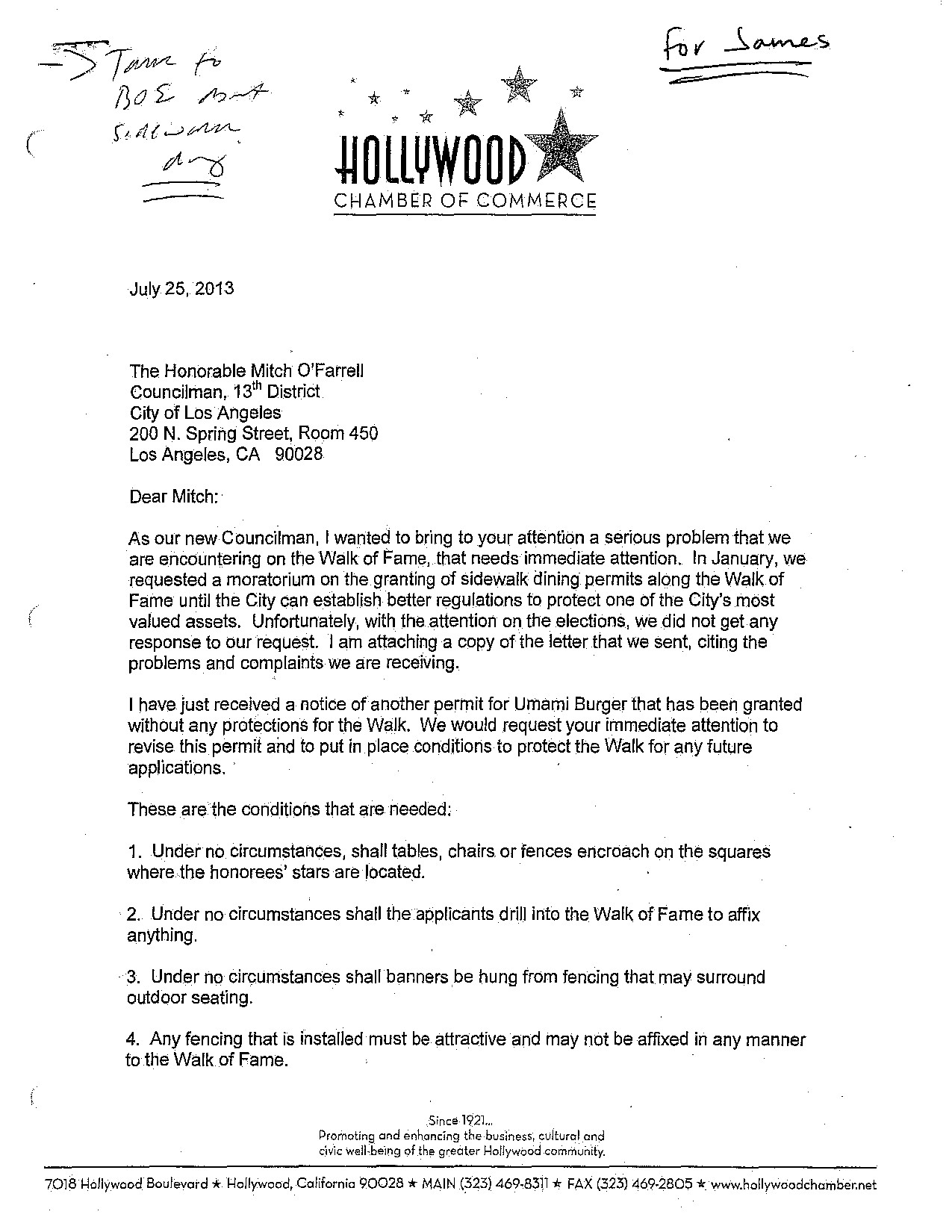
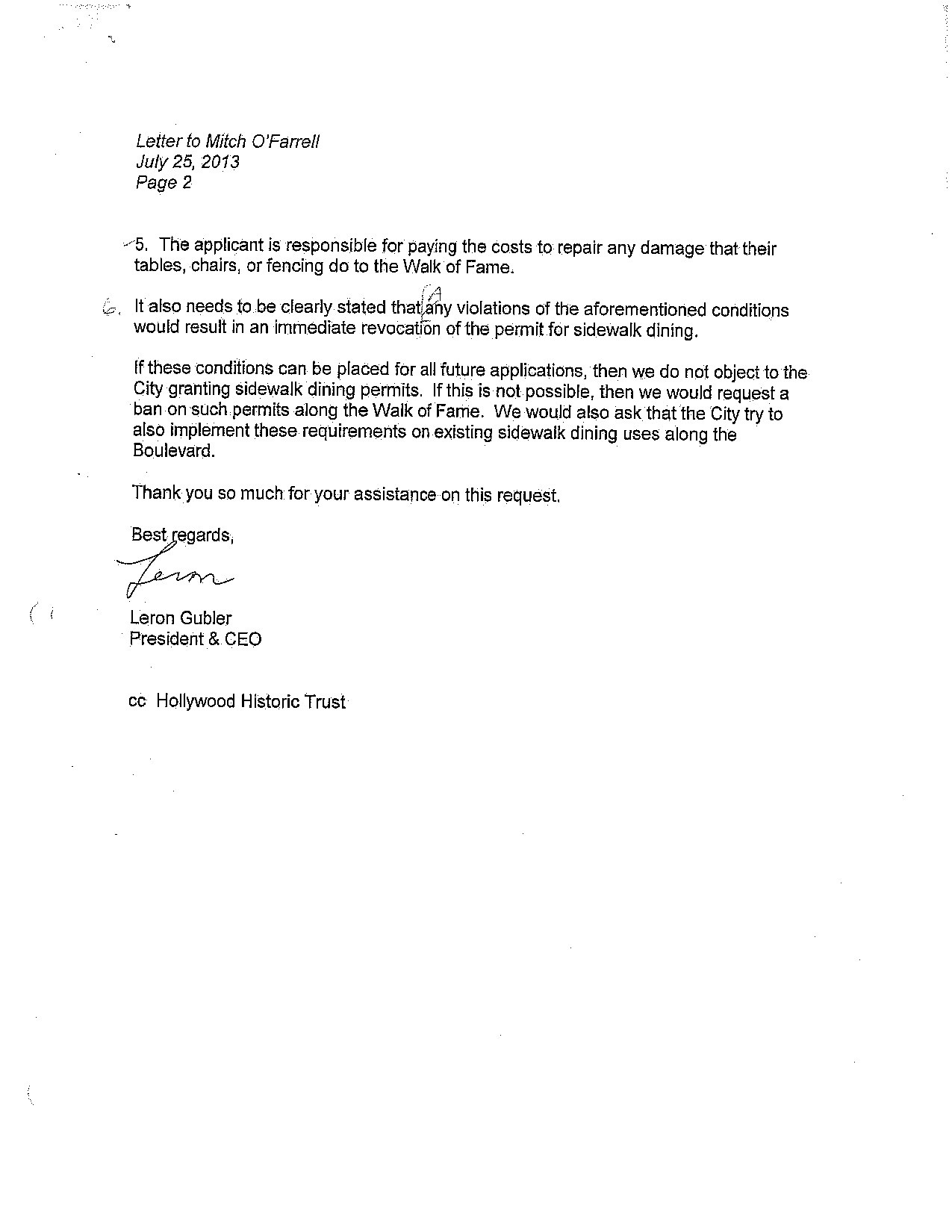
ENFORCEMENT
BOE staff are not tasked with inspecting or monitoring compliance with the permit requirements, including accessibility complaints. StreetsLA is the primary enforcement agency; however, BCA has also been badged to provide additional enforcement. The StreetsLA Investigation and Enforcement Division will be notified to investigate any complaints. Citations may be issued for non-compliance and permit violations may result in revocation of the permit. Compliance with permit requirements include:
- An Al Fresco Placard shall be posted in plain view from the outside of the restaurant indicating the approved encroachments permitted in the public right-of-way.
- Accessibility complaints
- Noise complaints
- Four-foot clear space between encroachments (tables and chairs) and obstructions, such as power poles, street lights, parking meters and trees is maintained. ADA compliant passing areas shall be provided at 200 foot intervals.
- Maintain the sidewalk in front of the restaurant in a clean and uncluttered manner at all times.
- No encroachments are within the visibility triangle as described in LAMC 62.200.
- Umbrellas approved by BOE personnel shall be mounted in a stable base to prevent accidental or wind-blown tipping over.
- Encroachments that are not specifically authorized under the R-Permit, such as heaters, fans, drop down enclosures, signs, planters, music equipment and valet podiums, shall not be allowed in the dining area.
- Electric and propane heaters are allowed to be used in the public right-of-way. A permit from LADBS or LAFD is not required for heater use so long as restaurants observe the below code and safety requirements:
- Electric Heaters (Cord Connected):
- Electric heaters must be a certified piece of equipment and the authorized L.A. Al Fresco authority holders must follow manufacturer listed specifications for use of the heater
- Electric heaters that are listed and certified by a recognized testing laboratory are allowed underneath umbrellas, awnings, canopies, and roofs. Please note, electric heaters must be used in accordance with their listings. A product’s listing and certification can be verified by reviewing the label adhered to the product itself
- Electric heaters must be plugged into a properly installed outlet. Code requirements do not allow electrical heaters to be powered by an extension cord. Therefore, electric heaters work best in outdoor dining areas that sit directly adjacent to a building.
- Cords should be covered by ADA compliant cord protection ramps in order to mitigate trip hazards shall not cross the pedestrian access route (PAR)
- It is recommended that electric heaters be placed at least 5 feet from combustible materials and must be situated at least one foot from fencing
- Electric Heaters (Cord Connected):
- Electric and propane heaters are allowed to be used in the public right-of-way. A permit from LADBS or LAFD is not required for heater use so long as restaurants observe the below code and safety requirements:
- No smoking is allowed within 10 feet of the sidewalk dining area per LAMC 41.50.
- No advertising is allowed in the public right-of-way per LAMC 67.02
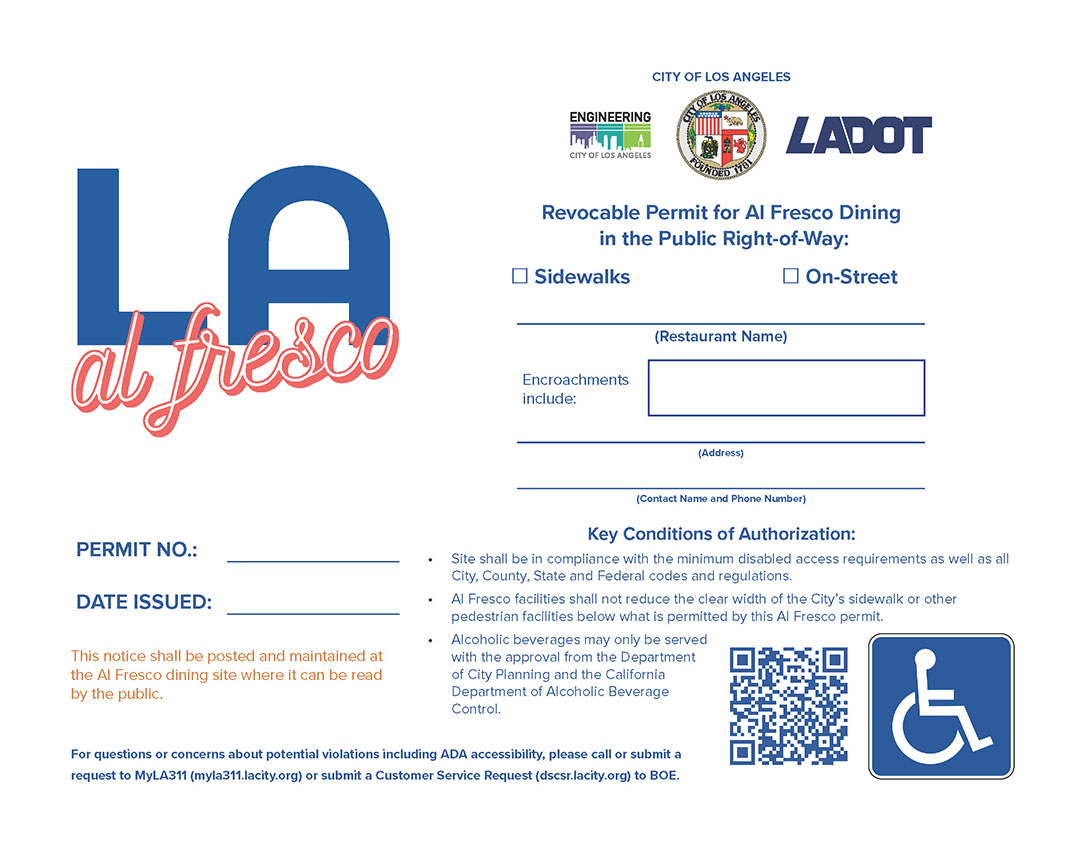
PERMIT REVOCATION
The following processes are per the 2019 Board Policy 797 - Establishment of Revocable Permit (R-Permit) Policy for Sidewalk Encroachments.
If there is any violation of the conditions of the Sidewalk Dining R-Permit, said permit can be revoked and the permit holder will be required, at no cost to the City, to remove the encroachments and return the public right-of-way to the satisfaction of the City Engineer. Depending on the restorations made to the public right-of-way, the permit holder may also be required to restore the public right-of-way to current local, state or federal standards through the issuance of an A or B Permit.
If a permittee or land owner wishes to cancel a Sidewalk Dining R-Permit, they must provide BOE staff a written request to cancel the permit. The permit holder will be required, at no cost, to remove the encroachments and return the public right-of-way to the satisfaction of the City Engineer. Depending on the restorations made to the public right-of-way, the permit holder may also be required to restore the public right-of-way to current local, state or federal standards through the issuance of an A or B Permit.
Once the right-of-way has been restored to the satisfaction of the City Engineer, BOE will issue the permit holder a letter stating the permit is no longer valid. This revocation letter will be required when the property owner wants to clear from the land title the Waiver of Damage that was recorded with the County of Los Angeles. The property owner is responsible for clearing the Waiver of Damages, not the tenant.
Fees
There is no fee collected from the permittee for revocation or cancellation of an R-Permit for Sidewalk Dining.
REVOCABLE PERMIT REQUIREMENTS (RPR) and Expiration
The BOE will prepare the RPR, which is list of conditions that must be met prior to issuance of the R-Permit for sidewalk dining along with a deadline to meet the listed conditions. The deadline is generally one year from the release of RPR by the City Engineer, but it may be shorter or longer as determined to be appropriate by the City Engineer. Should the applicant fail to meet the condition by the specified deadline, the application will expire unless an extension is granted.
A new R-Permit application and fee will be required in such cases where the application expires and/or where the applicant desires to change the scope of work to the extent that it requires an additional investigation and review. In cases where the scope change is minor compared to the original scope, the City Engineer may charge a Special Engineering Fee for subsequent applications.
A "Sample R Permit Requirements" can be found under R Permits, Checklists and Sample Documents. In addition, sidewalk dining has some unique elements of the RPR, all of which are included below.
- ADA Compliance requirements
- Sewerage Facilities Charges
Comments